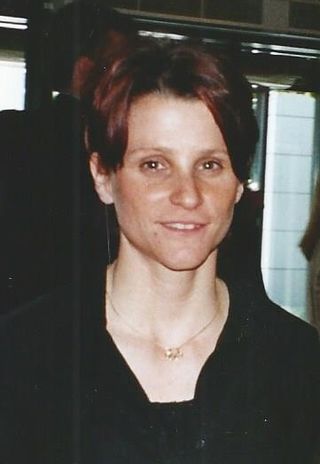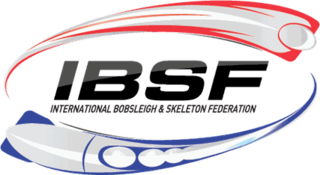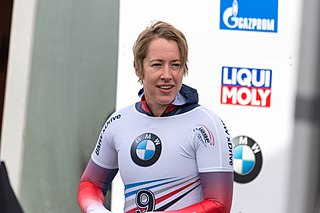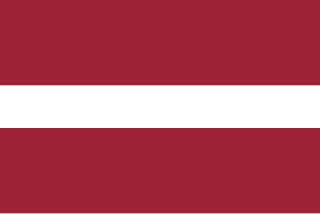
Skeleton is a winter sliding sport in which a person rides a small sled, known as a skeleton bobsled, down a frozen track while lying face down and head-first. The sport and the sled may have been named from the bony appearance of the sled.
Kristan Bromley is a retired British skeleton racer who has competed since 1996. He won the gold medal in the men's event at the 2008 FIBT World Championships in Altenberg, Germany. This was Great Britain's first gold medal at the FIBT World Championships since 1965.

Tomass Dukurs is a Latvian skeleton racer who has competed since 1998. Competing in three Winter Olympics, he finished fourth in the men's skeleton event at Vancouver in 2010 and Sochi in 2014.

Maya Pedersen-Bieri is a Swiss-Norwegian skeleton racer who has competed since 1995. She won the gold medal in the women's skeleton event at the 2006 Winter Olympics in Turin. She retired from the sport in 2010 before returning to compete for Norway in 2016, becoming at the oldest woman to start a World Cup race when she returned to the top level of skeleton in 2017. She is listed in the International Bobsleigh and Skeleton Federation athlete registration system as Maya Pedersen.

Noelle Pikus-Pace is an American retired skeleton racer who began her career in 2001. She won five medals at the FIBT World Championships, competed in the 2010 Winter Olympics in Vancouver, and won the silver medal in the 2014 Winter Olympics in Sochi.

The International Bobsleigh and Skeleton Federation (IBSF) is the international sports federation for the sliding sports of Bobsleigh and Skeleton. It was founded on 23 November 1923 by the delegates of Great Britain, France, Switzerland, Canada, and the United States at the meeting of their first International Congress in Paris, France. In June 2015, it announced a name change from FIBT to IBSF. The federation's headquarters are in Lausanne, Switzerland.

Aleksandr Vladimirovich Tretyakov is a Russian skeleton rider. Tretyakov is Olympic champion (2014), World champion (2013), European champion (2007) as well as two-times winner of the Skeleton World Cup, which he won in 2008–09 and 2018–19.

The Sigulda Bobsleigh and Luge Track is located in Sigulda, Latvia, built in 1986. Currently, the track manager is Dainis Dukurs, former bobsleigh brakeman and the father of skeleton racers Martins and Tomass Dukurs.

Kaillie Humphries is a Canadian-American bobsledder. Representing Canada, she was the 2010 and 2014 Olympic champion in the two-woman bobsled and the 2018 Olympic bronze medalist with brakewoman Phylicia George. With her victory in 2014, she became the first female bobsledder to defend her Olympic title and was named flagbearer for the Olympic closing ceremony with brakewoman Heather Moyse.
Michael Douglas is a Canadian skeleton racer who has competed since 2006. He played football and competed in track whilst at University in Toronto, and at the age of 30 he was discovered by racer Pascal Richard. He competed in the 2010 Winter Olympics but was disqualified before his third run for failing to remove the covers off the runner guards of his sled.

The men's skeleton event at the 2010 Winter Olympics in Vancouver, Canada, took place at the Whistler Sliding Centre on 18–19 February. Canada's Duff Gibson was the defending Olympic champion. Gibson retired after the 2006 Olympics. Switzerland's Gregor Stähli, the defending Olympic bronze medalist was the defending world champion, but did not compete due to a thigh injury sustained during the World Cup event in Lake Placid, New York, on 20 November 2009. The test event held at the venue was won by Jon Montgomery of Canada. The last World Cup event prior to the 2010 Games took place in Igls, Austria, on 23 January 2010 and was won by Latvia's Martins Dukurs who also won the overall World Cup title.

The women's skeleton event at the 2010 Winter Olympics took place at the Whistler Sliding Centre on 18–19 February. The competition was won by British athlete Amy Williams, who set new course records for the track on her first and third runs. Williams, who had never before won a World Cup or World Championship event, became the first British athlete to win a solo Winter Olympic gold medal in 30 years. German sliders Kerstin Szymkowiak and Anja Huber won the silver and bronze medals respectively. Williams' teammate Shelley Rudman, who had won the silver medal at the 2006 Winter Olympics, and Canadian Mellisa Hollingsworth, both of whom had been expected to be in medal contention, were disappointed.

Nozomi Komuro is a Japanese skeleton racer who has competed since 2004 and joined the Japanese national team in 2005. She uses a Bromley sled.

Elizabeth Anne Yarnold, OBE is a British former skeleton racer who joined the Great Britain national squad in 2010. With consecutive Olympic gold medals in 2014 and 2018, she is the most successful British Winter Olympian and the most successful Olympic skeleton athlete of all time from any nation. She won the 2013–14 Skeleton World Cup, followed by a gold in the 2014 Winter Olympics in Sochi. Yarnold was selected to be one of the two women skeleton drivers representing Team GB at the 2018 Winter Olympics in Pyeongchang, and went on to become the first person to defend an Olympic gold in skeleton and the first British athlete to defend a Winter Olympic title. Yarnold set the track record for women's skeleton at the Olympic venue in the final heat of the race with a time of 51.46 seconds, beating Jacqueline Lölling's pre-Olympic record by nearly 1.3 seconds and her own first-heat record by 0.2 second. Yarnold was also the flag bearer for Great Britain at the Pyeongchang opening ceremony.

Latvia competed at the 2014 Winter Olympics in Sochi, Russia, from 7 to 23 February 2014. The Latvian team consisted of 58 athletes in nine sports. These were the third consecutive games the country qualified to send 58 athletes.

Sophia Griebel is a German skeleton racer who has raced at the Winter Olympics and the Skeleton World Cup. She started racing skeleton in 2005 and was selected to the German national team in 2008; she was a luger before switching to skeleton. Her personal coach is Christian Baude and she uses an FES sled. Away from sport, she works for the German Federal Police. Griebel was injured in 2016 and spent 18 months recovering before returning to the World Cup circuit in November 2017, but after poor showings in the season's first two races, she was replaced on the German World Cup squad by Anna Fernstädt.

Lelde Priedulēna is a Latvian former skeleton racer, and was the 2016 Junior World Champion in the sport. She participated at the 2014 Winter Olympics in Sochi. Before starting skeleton racing, Priedulēna was a track and field athlete, competing in the 60, 100, and 200 metre sprint events. Like other Latvian skeletoners, she is coached by sled-builder and former Latvian bobsleigh driver Dainis Dukurs, and rides a Dukurs-built sled. She began international competition in 2010 on the Europe Cup circuit, but recorded only five starts during two seasons before being elevated to the Intercontinental Cup and World Cup tours. In the summer of 2017, she tore a cruciate ligament during training, but elected to forgo surgery and continue training in preparation for the 2018 Winter Olympics. In February 2019 Priedulēna announced end of her professional career due to the injuries.

Yun Sung-bin is a South Korean skeleton racer. He won the gold medal in men's skeleton at the 2018 Winter Olympics in Pyeongchang and was a participant at the 2014 Winter Olympics in Sochi.

Latvia competed at the 2018 Winter Olympics in Pyeongchang, South Korea, from 9 to 25 February 2018, with 34 competitors in 9 sports. They won one bronze medal in two-man bobsleigh and ranked 28th in the medal table.

















